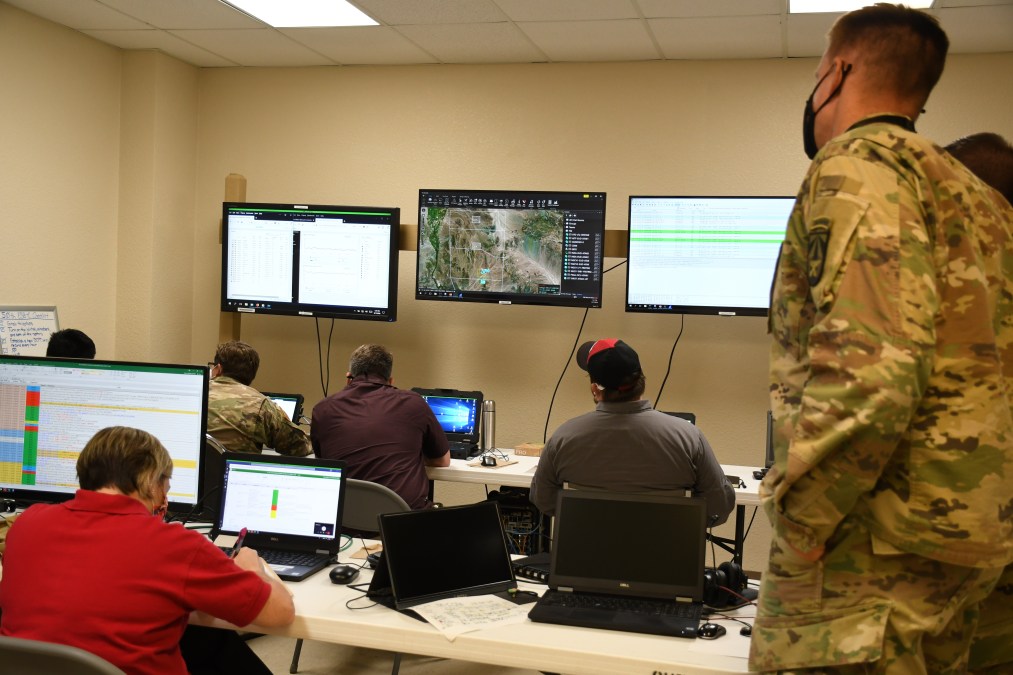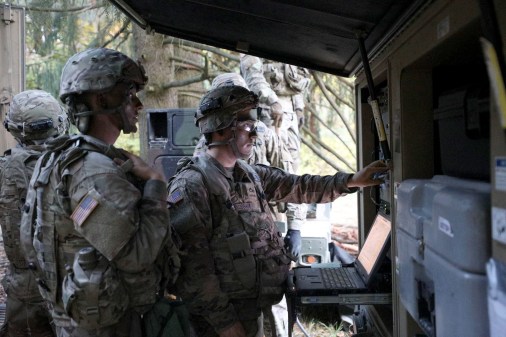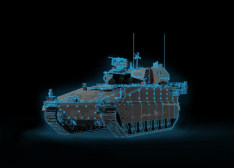How the Army prepared for Project Convergence with a virtual lab

As the Army forges ahead with plans to overhaul communication networks on the battlefield, a futuristic laboratory has provided an indispensable virtual proving ground for new technology.
The Joint Systems Integration Laboratory (JSIL) functioned as a virtual testbed in the year approaching this month’s Project Convergence 21, the Army’s biggest annual modernization exercise. The goal of both the test lab’s experiments and PC21 was to create a more resilient, connected and integrated network for soldiers to one day use in battle.
This was the first year in which the Army used a virtual testing environment for network tech, and is a part of a broader trend of testing new capabilities digitally before bringing them into the physical world.
“When Project Convergence 20 was running, the lesson learned was we needed the … labs to do the integration a head of time,” Kimberly Moeltner, systems engineering and integration branch chief at the JSIL, said in an interview with this publication.
PC21 and the overall Project Convergence enterprise, is nested within the broader military-wide push for Joint All Domain Command and Control (JADC2), where a network-of-network would try to provide a common operating picture for commanders and integrate fighting between air, land, sea, space and cyberspace operations.
The lab played a new and integral part of testing that gave commanders access to a virtual environment before the major test event in Yuma concluded in mid-November.
The lab was set up to emulate the Army’s current network, with all its constraints and capabilities, Moeltner, said. The system can also replicate the in-person obstacles, like distance and interference.
“When you are in the JSIL it’s literally an arm’s reach away,” Moeltner said.
One of the big wins that came from having the virtual lab to test communications tech was a dramatic reduction in the time it took to run through risk-reduction tests. What usually takes six weeks of testing for cyber weaknesses took just 10 days this year, Moeltner said.
“We can wring out a lot of the issues,” she said. The Army plans to use the JSIL for future events and exercises to continue speeding up needed tests on networks before they can be put in the field.
The tech
The lab is a combination of software and hardware that emulates the tactical military networks in use today. They offered a plug-and-play system for testing, but also had to emulate how disorganized the military’s current system is.
“We do a lot of network trouble shooting,” C5ISR Center Director Joseph Welch told FedScoop.
What the JSIL represents is a growing trend of using technology to test new capabilities before sending them to the battlefield. Engineers building airplanes are working a similar concept when designing planes called digital engineering or digital twins. By “twinning” the network, the Army can replicate and virtually test how it transports data.
It’s a direction that Welch says the JSIL is a critical a part of. As more systems develop virtual twins, there will be more need for virtual testing.
“As programs bring on digital twins, I perceive the JSIL to grow in its ability to have a positive impact,” he said.
Connections across services
The JSIL is also cementing relationships with labs across the country. For the tests done with Project Convergence, the JSIL worked with 13 joint service labs. The labs connected their virtual networks to test radio systems and other network tech without needing to send employees on travel assignments, saving time and money.
“All the SMEs didn’t need to fly out here,” Welch said.
With more time and practice, the cross-lab connections are expected to grow.
With the conclusion of PC21, the lab’s work will continue on future JADC2 and other modernization test events. The Army plans to integrate allied and partnered militaries into future PC exercises, giving more opportunities to grow the lab to both simulate the complex connection of networks and test new tech.
“You want a lab environment for these in-between events,”added Welch.




